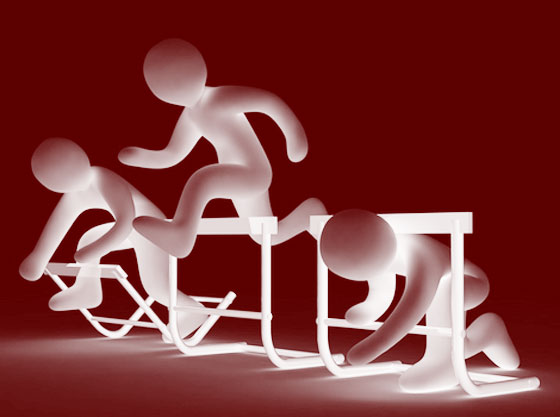Barriers to Change in Addiction
When dealing with addiction there are many barriers to change.
In addiction, drug or alcohol dependency can be both biological
and psychological. For instance, cravings can be both physiologically-based
and the addict can also have a psychological attachment to the
drug of choice.
 Barrier to Change
Barrier to Change |
|

Physical dependency on drugs or alcohol is one of the major barriers
when it comes to addiction. The addict may not wish to try for
sobriety when their may be intense pain due to withdrawal involved
in the process.
Past experience of withdrawal and relapse may make the addict leery
or gun-shy about breaking the physical dependency.
As difficult as physical dependency is to kick for many substance
abusers, psychological or emotional dependency may even be tougher
to break. For instance, many addicts start using because of underlying
issues with depression, anxiety, post-traumatic stress disorder
(PTSD) or other mental or emotional issues. When drugs or alcohol
are no longer being used, all of a sudden, unpleasant feelings
may overwhelm the substance abuser, which encourages using again
to make the feelings go away.
Another barrier to change
when it comes to addiction is the beliefs and attitudes
of the user regarding drugs or alcohol. The abuser may think they
are weak or helpless when not using or believe that they in some
way cannot cope or even that they are a bad person. The substance
abuser may use their drugs of choice in order to avoid these unpleasant
thoughts and keep them at bay.

Family and friends may be another barrier to change in addiction.
The addict may have some "enabler" spouses, family
member or friends who encourage the drug or alcohol use and
respond negatively when the abuser stops using their drugs
of choice.
Beyond enabling friends or family members the abuser may
also have toxic people in their lives as well. These people
may have far more negative impact on the substance abuser
than even the enablers (though enablers and toxic persons
can be both) in that the toxic people may also have a negative
impact on self esteem and may be critical of all areas of
the addicts life, not just the life surrounding the drug or
alcohol abuse.
A lack of adequate support
system is also a barrier to change for many addicts.
As addicts tend to increasingly isolate themselves from family,
friends and others, after awhile they may only be surrounded by
enablers and toxic people and lack sufficient positive social
influences to maintain sobriety.
The good news is that there are many ways in breaking
the barriers to change in addiction. For all new addicts
who come onboard the recovery train, many more have already
been there, dealt with the same barriers and are now living
clean and sober lives.
|


